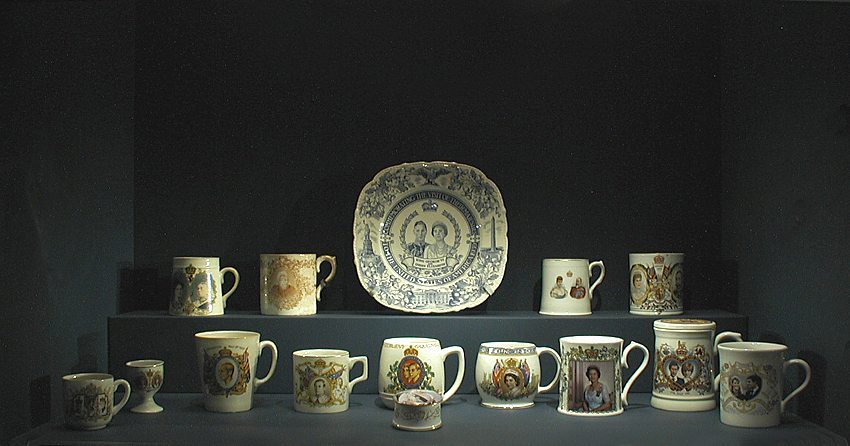
Our
kings derive not their title from the people, but from God…it belongs not
to subjects either to create or censure, but to honour and obey their sovereign.
Elders of Cambridge University on the Divine Right of Kings, 1681
The ancient notion of the divine right of kings was already beginning to be
questioned when the Cambridge professors claimed otherwise. By the time the
British had been through four Georges and two Williams, the concept was obsolete.
Even during the outwardly glorious reign of Queen Victoria, anti-royalist muttering
was regularly heard in the halls of power.
The twentieth century began with the death of Victoria and ended on the eve
of another Queen’s hundredth birthday. The series of commemorative mugs
spanning those years did for them precisely what the Porto Bello bowls, Nelson
mugs, and Caroline pitchers had done for the eighteenth and early nineteenth
centuries. Like a miniature chamber pot in the Noël Hume collection, they
cried “Remember me, when this you see.”
A faded black ribbon around the mug made to commemorate Victoria’s Diamond
Jubilee in 1895 speaks eloquently of a nation’s sorrow at her death in
1901 (2). Mugs prematurely made to herald the crowning of Edward VIII in 1937
went begging when he quit to marry a Baltimore belle, but they were said to
have sold well in the West Indies where the difference between Edward and his
brother George could pass unnoticed (7 and 8). George, Duke of York, and his
wife Elizabeth would do much to restore faith in the monarchy. In 1939 their
visit to the United States helped prepare the two nations for partnership in
World War II (10).
The accession of the young Elizabeth II following her father’s early death
in 1952 found her realm struggling to maintain a place at the high table of
a changing world (11). Alas, the lives of her children and their spouses would
bring more sorrow than joy to the House of Windsor (13 and 14). But that is
a story for future pottery collectors to tell.
1.
Mug commemorating Queen Victoria’s Diamond Jubilee, creamware. 1897.
2.
Mug commemorating the Diamond Jubilee, white ware. A mourning ribbon was added
in 1901. 1897.
3.
Mug depicting the coronation of Edward VII and Queen Alexandra, bone china.
Royal Doulton, 1902.
4.
Mug depicting the coronation of George V and Queen Mary, white ware. Made for
Harrods Ltd., 1911.
5.
Coffee cup commemorating George V and Queen Mary’s silver jubilee, white
ware. 1935.
6.
Egg cup commemorating George VI and Queen Mary’s silver jubilee, white
ware. 1935.
7.
Beaker commemorating Edward VIII’s expected coronation, white ware. British
Anchor, 1937.
8.
Mug commemorating Edward VIII’s expected coronation, white ware. Royal
Doulton, 1937.
9.
Mug commemorating George VI and Queen Elizabeth’s coronation, white ware.
Pountney, Bristol, 1937.
10.
Plate commemorating the visit of George VI and Queen Elizabeth to the United
States, white ware. John Maddock & Sons, 1939.
11.
Mug commemorating Queen Elizabeth II’s coronation, bone china. Aynsley,
1953.
12.
Mug commemorating Queen Elizabeth II’s sixty-fifth birthday, bone china.
Aynsley, 1991.
13.
Mug and lid commemorating the marriage of Charles Prince of Wales and Diana
Spencer, white ware. 1981.
14.
Mug commemorating the marriage of Prince Andrew and Sarah Ferguson, white ware.
Prince William Pottery Co., 1986.
15.
Pin box commemorating the 100th birthday of Queen Elizabeth the Queen Mother,
bone china. Royal Crown Duchy, 2000.

